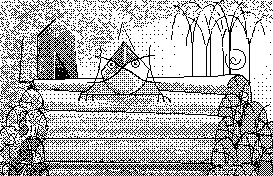I know some of my friends are busy now in preparation for winter,
although here, San Francisco has almost no serious winter days. How are you in your place?
For this month, I'd like to translate this haiku by Duncan MacLaurin in Fanø, Denmark,
where they are preparing firewood.
A frog must look cold on the day before its hibernation.
"Naked" expresses the scene very well.
I found this haiku in the new Interlingual Haikai Journal, Lishanu (Autumn 2005 • Issue 1)
Also I'm going to submit my EL haiku to its winter version, by their invitation.
So you might see some of my EL-English-Japanese haiku in the Lishanu site later, too.
今月はデンマークのDuncan MacLaurinさんの俳句を訳します。
新しいバイリンガルの俳句ジャーナル、Lishanuから冬号のために
地球語俳句で参加しないかとお誘いをいただき、
応募するついでに、この俳句を 創刊の秋号 で見つけました。
北の人々から冬支度で忙しいという便りが届きますが、この俳句もそんな光景、
寒そうに見えた蛙を裸と表現したのが光ってますね。
デンマーク語と英語では少し内容が違うそうですが、
地球語ではオリジナルのほうの英語のイメージに合わせました。
 English haiku by Duncan MacLaurin:
English haiku by Duncan MacLaurin:
















 : frog (蛙),
: frog (蛙),  : tree (木),
: tree (木),  : wood to
use (利用される木),
: wood to
use (利用される木),  : a building (建物),
: a building (建物),  : small (小さい),
: small (小さい),  : the sun
(太陽)
: the sun
(太陽) {
{ behind,
behind,  point}: the tail/the
last (最後部/最後)
point}: the tail/the
last (最後部/最後) {
{ one,
one,  part}: piece (部分/かけら)
part}: piece (部分/かけら) {
{ {
{ heat,
heat,  spread/open}: fire火,
spread/open}: fire火,  thing}:
fuel (燃料)
thing}:
fuel (燃料) {
{ tree,
tree,  function}: wood (as
a material to use) (利用される木)
function}: wood (as
a material to use) (利用される木)
 : wood as fuel (薪)
: wood as fuel (薪) {
{ {
{ e-verb symbol,
e-verb symbol,  receive}: to form the passive voice of a verb,
receive}: to form the passive voice of a verb,  {place, balanced}: being put
in order, arrangement (in this case this ideogram modifies the next) (整頓)
{place, balanced}: being put
in order, arrangement (in this case this ideogram modifies the next) (整頓) : piled (積み重ね)
: piled (積み重ね)

 : being piled in order (modifies "the last piece of wood") (整頓して詰まれた)
: being piled in order (modifies "the last piece of wood") (整頓して詰まれた) {
{ joined,
joined,  {
{ pointing,
pointing,  outward}:
other/others (you can compound
outward}:
other/others (you can compound  too, but plural-distinguishing is not always necessary in EL. Here you
can easily imagine it's plural through the meanings of other words.) (他)
too, but plural-distinguishing is not always necessary in EL. Here you
can easily imagine it's plural through the meanings of other words.) (他)
 (usage of plural dots): to show a pause (複数連ねると、ポーズの働き)
(usage of plural dots): to show a pause (複数連ねると、ポーズの働き) {
{ air/space,
air/space,  water,
water,  related, and
related, and  (jump) up}(also
as a picture-like fundamental ideogram): frog (蛙)
(jump) up}(also
as a picture-like fundamental ideogram): frog (蛙) {
{ body-shape,
body-shape,  existing}(as
a fundamental): sitting situation (座)
existing}(as
a fundamental): sitting situation (座)  : sit (すわる)
: sit (すわる) {
{ condition,
condition,  {
{ opposite,
opposite,  covered}: bare/naked
(裸)
covered}: bare/naked
(裸)